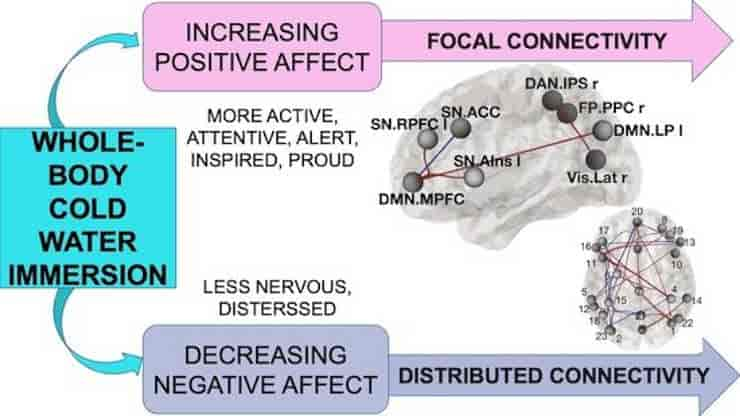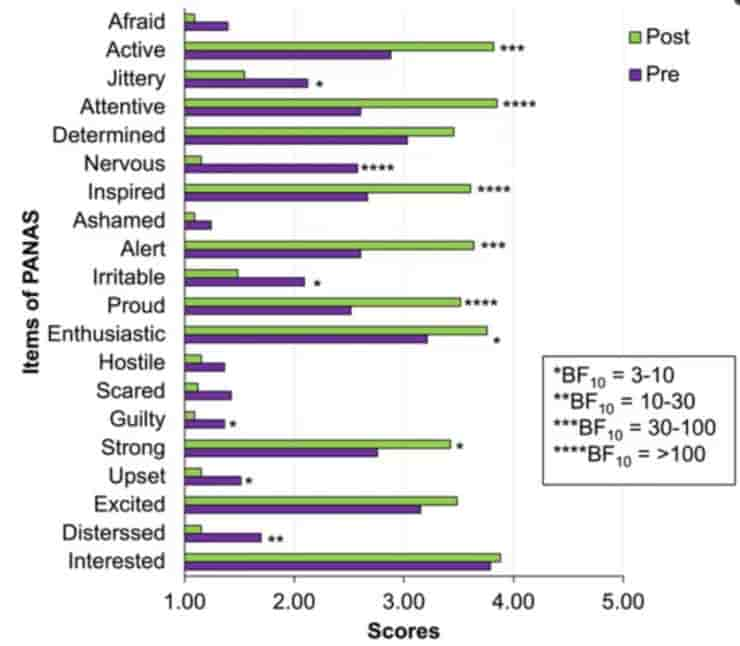After immersing a person’s body in cold water, a team of researchers observed changes in how different brain parts interact. The findings explain why people often feel more energized and alert after swimming in the open air or taking cold baths.
A functional MRI (fMRI) scan was performed on healthy volunteers immediately after bathing in cold water during a research trial. These scans revealed changes in the connectivity of the brain’s parts that process emotions.
The University of Portsmouth, Bournemouth University, and University Hospitals Dorset (UHD) research team recruited 33 volunteers for the trial. Imaging experts from Bournemouth University and UHD joined the team, as did extreme environment researcher Dr. Heather Massey from the University of Portsmouth.
Cold Water Immersion Brain Benefits

With the growing popularity of outdoor swimming and cold water immersion to support improved mood, it is long past time that we investigate how it may affect us.
“We know so much about the impact cold water immersion can have on the body, but the brain has had little focus, primarily as it has been more challenging to study. It is only now that technology is developing, can we start to get some insight,”
said Dr. Massey.
The benefits of cold-water immersion, also known as cold shock, are well known from previous studies in which participants were asked how they felt afterwards. Positive effects have been seen for the immune system, symptoms of depression, and fatigue. Whole-body exposure to cold is known to trigger the release of neurotransmitters such as serotonin, dopamine, norepinephrine, cortisol, and β-endorphin.
But the researchers wanted to see how the shock of entering the cold water affects functional connectivity in the brain. Each participant in their study was given an initial fMRI scan at Bournemouth University’s Institute of Medical Imaging and Visualisation.
They were then immersed in a pool of 20°C water for five minutes while an ECG and respiratory equipment recorded their physiological responses. They were quickly dried and then given a second fMRI scan to see if there were any changes in their brain activity.
Medial Prefrontal and Parietal Cortexes
When we carry out activities in our daily lives, many parts of the brain are connected to one another in a specific pattern, allowing the brain to function as a whole.
“After our participants went in the cold water, we saw the physiological effects, such as shivering and heavy breathing. The MRI scans then showed us how the brain rewires its connectivity to help the person cope with the shock,”
said study leader Dr. Ala Yankouskaya.

Credit: Biology (2023). DOI: 10.3390/biology12020211
The medial prefrontal cortex and the parietal cortex, in particular, showed changes in connectivity between specific brain regions when the scans were compared.
“These are the parts of the brain that control our emotions, and help us stay attentive and make decisions. So when the participants told us that they felt more alert, excited and generally better after their cold bath, we expected to see changes to the connectivity between those parts. And that is exactly what we found,”
Dr. Yankouskaya said.
Mental Health Applications
In certain medical procedures, immersion in ice-cold water is also used to help reduce swelling and inflammation. However, it should be pointed out that cold water immersion can be hazardous to one’s health.
Hypothermia, shock, and the possibility of sudden cardiac death are all risks. Greater peripheral vasoconstriction in response to mental stress, for example, is linked to a higher risk of adverse cardiovascular outcomes in patients with coronary artery disease.
The team members intend to use their discoveries to learn more about how the wiring and interactions between the different parts of the brain work in people who have mental health issues.
“The medial prefrontal cortex and parietal cortex have different wiring when people have conditions such as depression and anxiety,”
Dr. Yankouskaya noted.
Understanding how the connectivity is so different for people with these conditions could help us learn why and, hopefully, in the long run, lead to alternative treatments.
References:
- Yankouskaya A, Williamson R, Stacey C, Totman JJ, Massey H. Short-Term Head-Out Whole-Body Cold-Water Immersion Facilitates Positive Affect and Increases Interaction between Large-Scale Brain Networks. Biology. 2023; 12(2):211.
- Datta A, Tipton M (2006). Respiratory responses to cold water immersion: neural pathways, interactions, and clinical consequences awake and asleep. Journal of Applied Physiology. 100 (6): 2057–64. doi:10.1152/japplphysiol.01201.2005
- Y. V., Shah, A. J., Vaccarino, V., & Quyyumi, A. A. (2019). Peripheral Vasoconstriction During Mental Stress and Adverse Cardiovascular Outcomes in Patients With Coronary Artery Disease. Circulation research, 125(10), 874–883
- Wittmers LE (2001). Pathophysiology of cold exposure. Minnesota Medicine. 84 (11): 30–6
